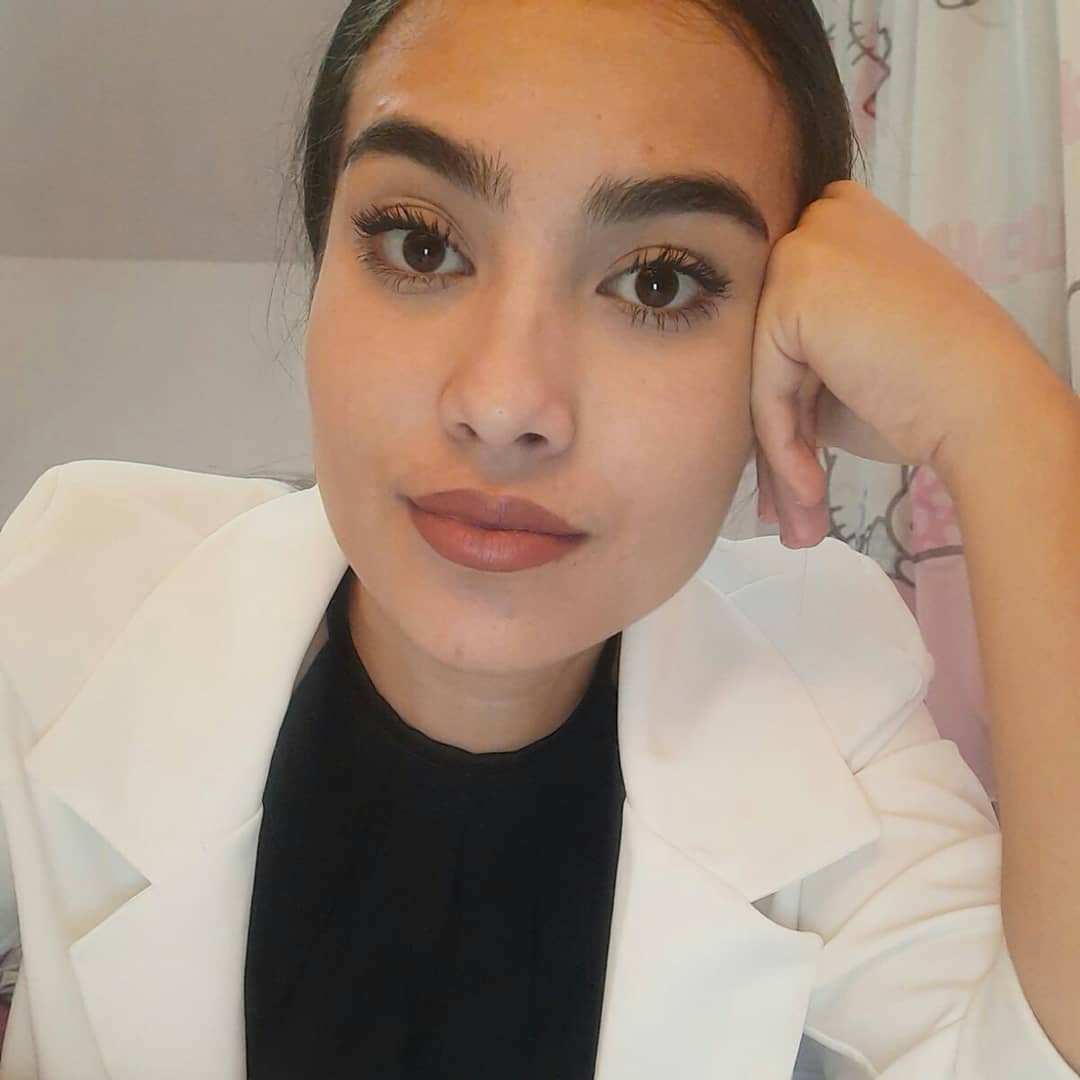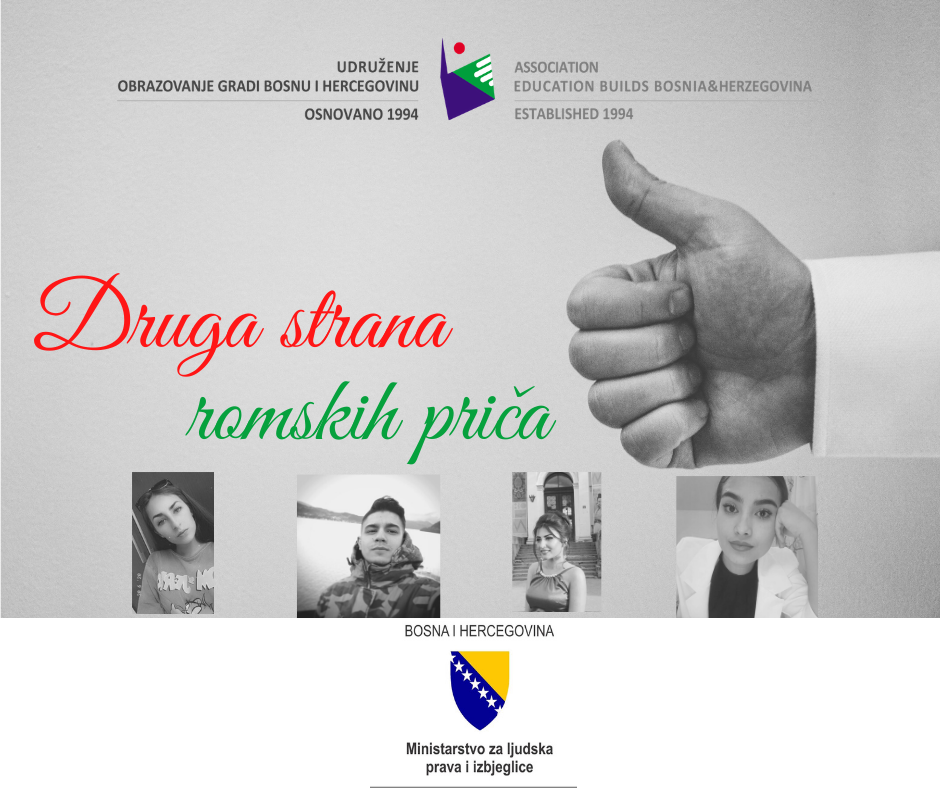
The other side of Roma stories: Belma Zahirović
Not many children went through the Association with the desire to be doctors, but those who did, very often became so. Today, they are working on the front lines in hospitals and health centers, and one of those who will one day join them is 15-year-old Belma Zahirović.
About the school and the city where she lives
Belma is a first-grade student at the Medical School “Katolički školski centar Sv. Josip”. She is attending the physiotherapist course, and although she is just starting out in the medical profession, she already has a firm decision to continue her education after high school at the Faculty of Health Studies. Belma is a good and hard-working student, although, as she says, it used to be not easy.
“I attended Hasan Kikić Elementary School before enrolling in high school, and my schooling was no different from the process of educating other students, at least in terms of teaching. There were beautiful and ugly experiences. I had problems with discrimination in elementary school. in the third grade there was an incident when the girls stabbed me at the very edge of the board and called me a gypsy and stressed that they didn’t want to hang out with me.Of course, that was resolved, and the girls realized they made a mistake when they were little grown up. I have given only one part because I do not want to give many details, and every time I tell them, I do it to show the children that people are not watched and condemned by nationality and that the basic and only division of people is the division into good and bad. There are good people, I’m sure of that. I love my city, Baščaršija especially. I don’t plan to go outside BiH, I see my future here, but I haven’t closed that door completely. Never say never.”
Aware of the situation in which her peers are members of the Roma nationality, Belma is grateful for everything she has. She talks about everything openly and without restraint because she is aware that only in this way she really helps to gain real insight into the situation.
“Unfortunately, many Roma children do not have the basic necessities of life from clothes and shoes, which is why their peers tease them. But they also do not have the financial means to provide textbooks and school supplies that are necessary for schooling. Nowadays, it is often the case of belittling peers if they do not have the same things and if they behave differently. For this and other reasons, Roma children lose motivation to learn. I had the opportunity to see the conditions in which other Roma children live. Their lives are ruled by poverty. Rarely does anyone have a house and most of them are sheds or barracks where 8-10 family members live, and sometimes more. I think that in such conditions, it is very difficult to provide children with the basic things for life, starting with the housing issue, and then clothes, shoes and school supplies. There is something that has remained in my memory and that I will never forget. It was 2018 when a pedagogue came to us and said that a surprise awaited us. There were Roma children from the first to the ninth grade in the school premises, and of course our dear Jovan Divjak with his assistants who handed us New Year’s packages. They talked to us and asked us how we were doing in class and if we had any difficulties. Then we thanked them and I remember that one boy got up and started singing as a sign of gratitude and Jovan started dancing which made us laugh even more. It stuck in my memory as one very fond memory and I actually started receiving a scholarship from then on. Given that Roma children do not have the basic necessities of life, and the situation with the coronavirus that caused classes to take place online, it is important to note that children are in such a situation that they do not have the necessary device to follow the curriculum. I believe that teachers should have understanding for all children, including Roma, and help them in the implementation of teaching. “
Foreign languages are important, she tells us, so she would love to learn and perfect them.
“I understand the Turkish language very well and I can communicate, while English and German create problems for me during my schooling and I would like to further improve them through various courses. I must mention that knowing the languages is very important and that knowing them could contribute to me in the future. “
Belma is a versatile young girl. She loves and appreciates art, she believes that the same talent is necessary, but above all she values work. She is an excellent student, and her mother is her greatest support and motivation. She has no doubts about her success, because she is valuable and has clear goals.
“I think that online education is very difficult and that concentration is easily lost. Professors as well as teachers have technical difficulties, and the class itself lasts 30 minutes and is sometimes difficult to follow. In a conversation with a person very dear to me, the question arose as to how I find motivation. We are our best friends / enemies in that sense. I also put a white coat on the hanger where my clothes are, and so when I run out of motivation or don’t have the will to learn, I just look in my coat and ask myself, “Do you really want that?”. I also find motivation in my mother because she is proof that if you have the will, desire and of course support, anything is possible, even at the age of 35. In that period when she was in school, she went through many obstacles, but she was brave enough, driven by desire, she succeeded and I actually admire her. I think that I will have a greater privilege in enrolling in college and in employment because I am a Roma woman and I belong to a minority. I also think that future colleagues will be proud to work with a person who is Roma, although they may have learned that Roma are not educated. I’m here to change that stereotype. “
Belma’s advice
Doing what makes us happy and fulfilling are the words with which Belma rounds out the point of life. We will always encounter obstacles, but the way we overcome them defines us as persons, she says. She is made happy by little things, friends, and the most important thing; when her loved ones are healthy. Here is what Belma is telling her peers:
“No matter how much we are held back in life, and believe that it will be every day, both by friends, relatives, and even the most insignificant passers-by, do not be afraid. We are here for each other. We should be determined and persistent in our goal, and fight as much as possible. I think elementary as well as high school education is very binocular and we should actually finish what we love and want. Remember, you don’t have to get a college education to be appreciated and believe that effort and work are easily recognized. You don’t have to be doctors, professors, principals or anything like that. It is much more important that you have your own job that you will do with a smile on your face. Decide for yourself what you want to study because you will still do the job.“


